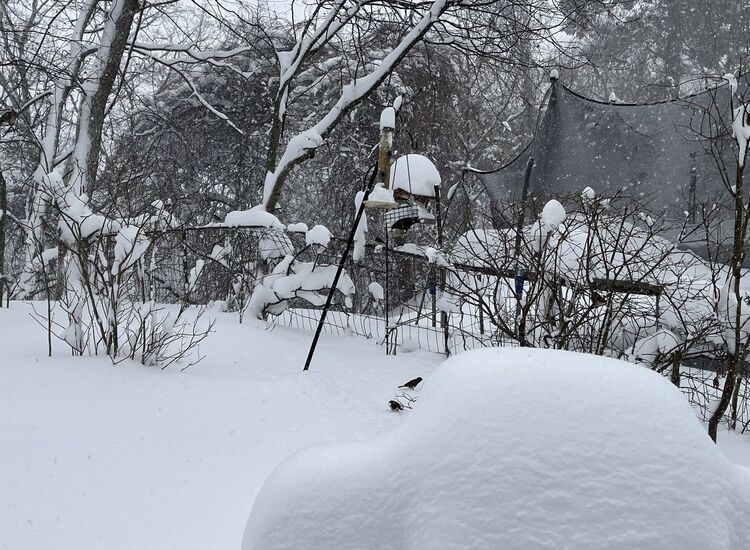The author's mother posing for a photo on a mower on the family farm near Mountmellick, Co. Laois.
By Tom Phelan
In Irish farmyard parlance a brooding hen is called a “clocking” hen. When her brain instructs a hen it’s time to hatch eggs, she goes into clocking mode. Besides having an urge to sit, her gastrointestinal system changes, allowing her to relieve herself only once a day. For three weeks, this bathroom break and the quick minutes she spends gobbling down some strategically placed food and water, are the only times she is not sitting her clutch of eggs.
If a clocking hen has no eggs to sit on, she will plop down anywhere and refuse to budge. Whenever one began hatching the gravel in the middle of our farmyard Dad threw a bucket of water on her, saying, “That’ll knock the clocking off ya!” and the bird scuttled off as mad as a wet hen.
Once, one of Mam’s hatching hens lost her broodiness a week after her confinement began and she abandoned her nest. If eggs are left too long without feathery warmth, the embryos die. A new clocker had to be found quickly, and a state of emergency was declared.
My twelve-year-old sister Rita was hurried off to Granny’s in Derrycloney, two miles away, to get a substitute. Dad shook the barley dust out of a burlap sack and put it along with a piece of twine in the handwoven basket attached to the front of Rita’s bike. “Don’t be stopping to talk to anyone when you’re going through the town,” Mam told Rita.
Ignoring all distractions that would interfere with her mission, Rita sped up to Granny’s. There, she had no trouble catching Granny’s clocker, which was hatching a piece of a peat in the turf shed.
“Will you calm down, child! You’re giving me the heebie-jeebies,” Granny said as she held the burlap sack open to receive the hen. She tied the twine around the sack’s neck in a double knot, as if the hen was an avian Houdini. Then, caught up in the grand opera of her own creation, Rita pedaled away at top speed. She didn’t hear Granny calling, “Don’t fall off that bike, child!”
At the T-junction where the Derrycloney road meets the main drag through Mountmellick, the hen in the bag squawked, and her squawk sounded as loud and squawkish as the horn of Johnny Hayes’ Model T Ford. Rita glanced around nervously, expecting a passerby to upbraid her for her rudeness. She pedaled furiously down toward the middle of the town. When she got to Dowlings’ butchery, the hen squawked again, and Rita was certain the people on the footpath knew it was she who had spluttered the raucous strawberry. She sped away.
As she was passing the Square, the hen imitated Johnny Hayes’s horn again. The mortified Rita, hoping to silence the bird, laid her hand on the sack where she believed the hen’s head was. When she passed John Marshall’s chip shop, the hen screeched. Rita put more pressure on the hen’s head, and she didn’t take her hand away until she reached the top of Laragh Lane. There, as she swerved between the rain-filled potholes, she became concerned there were no squawks or movements coming from the sack.
Getting off her bike at Hourigan’s humpy bridge, Rita untied Granny’s double knot. The hen did not move. When Rita took the bird out, she thought it was unconscious. In a panic, she stuck its head into the nearest puddle to revive it. But the unmoving blue eyelid under the water told her the hen had departed for heaven.
Realizing she had a dead hen on her hands and knowing that every minute counted for Mam’s abandoned clutch of eggs, Rita, incapable of moving, knelt beside the corpse. “I’ll be kilt!” was the thought gluing her to the wet gravelly surface of the lane.
But thirty yards away, limping down the Furze Hill, came an angel wearing a long black coat with a furry collar, the head of a dead fox with glass eyes resting at each lapel. It was our neighbor, Missus Fitz, on her way to clean Doctor Dwane’s office for half a crown.
“What happened to you, child?” Missus Fitz asked.
Rita erupted, and through slobbering tears and gasping breaths, she told her tale of woe. “Daddy will kill me for killing the hen.”
“No, child, he won’t.”
“He will so. And I’ll never be able to go up the town again with everyone squawking at me.”
“Your father won’t kill you. I’ll go home with you to make sure he doesn’t.”
With the deceased hen under the sack in the basket, Rita walked the bike home, Missus Fitz limping beside her. Trying to distract Rita from her imagined impending doom, Missus Fitz recited her oft-told story of how she broke her hip when Father Kelly’s dog knocked her off her bike years before. “Breaking a hip, and being in hospital for weeks, is much worse than having a dead hen.”
When the cortege reached the farmyard, Rita, through a waterfall of tears, told Dad how she had failed in the mission to save Mam’s clutch of eggs. “I killed the hen,” she said in wail that sailed over the loft roof.
“No, you didn’t, Rita,” Dad said. “It’s my fault she died. We were all in such a hurry to get a new hen that I gave you the barley-meal sack, and the dust from the ground barley blocked out the air. The hen smothered.” At critical times of childish distress, Dad managed to hit the parental nail smack on the head.
“See, I told you, child,” Missus Fitz said. “Now, I have to be off to the doctor’s office.” When she closed the wicket door behind her, Dad asked Rita, “What did Missus Fitz tell you?”
“She said you wouldn’t kill me for killing the hen.”
“Kill you? You brought home tomorrow’s dinner! You can take Granny a hen leg tomorrow and a new hen.”
Mam had to get rid of the abandoned eggs. My brother Eddie and I made a game of flinging them against the back wall of the cowhouse to create exploding yellow bombs and to smell the glorious stink.
© 2021, Glanvil Enterprises, Ltd. Tom Phelan is the author most recently of the memoir “We Were Rich and We Didn’t Know It.” For more about his books, visit tomphelan.net.









